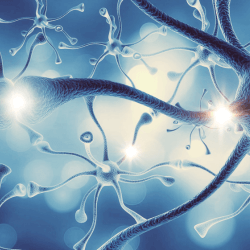Overview and Brain Health
The nervous system is the most complex system in the body. It contains over 100 billion neurons and 98% of the neurons are located in our brain. We are electrical beings, and every part of our body is interconnected by a communication system of nerve cells. Nerve cells communicate through a combination of electrical impulses and chemical messengers. Our nervous systems are what ‘wires us together”.
The brain is the control center of the body and is protected by our skull. It is amazing that our brain makes up about 2% of our body weight yet uses 25% of our oxygen and 20% of our sugar (and I don’t mean candy and cookies). The brain has an extremely high metabolism. The phrase “You are what you eat”, couldn’t be more true where our brains are concerned.
Several studies have shown strong links between our nutritional intake and various neurological and psychiatric conditions. A junk food diet produces an unhealthy brain. I don’t know why people are not more conscious of what they are eating. I wouldn’t buy an expensive car and go to Wal-Mart to change the oil. So why do Americans eat so much junk food or should I say food lacking in nutritional value. A sound mind and a healthy body are gifts, and it is our job to take care of them. So please eat good food!
Understanding our Nervous System – A Very Basic Overview
The nervous system consists of our brain, spinal cord, and peripheral nerves. The nervous system regulates everything that is happening consciously and subconsciously throughout the body. The conscious part of our nervous system is what we process through our senses. It is also how we analyze and remember information and how we move our muscles to regulate how we walk or ride a bike.
The subconscious nervous system, or the autonomic nervous system, does everything else. This system is responsible for our subconscious activities like regulating blood pressure, breathing, sleeping, and digesting our food. The autonomic nervous system has two parts. The sympathetic and parasympathetic system. The sympathetic nervous system (the nervous system affected by my RSD) is the flight or fight part of the autonomic nervous system. This nervous system revs us up, and the parasympathetic nervous system relaxes us and rebuilds the body.
How the Nervous System Works
Nerves communicate through electrical impulses and chemical messengers. When a neuron or nerve cell gets stimulated, it fires an electrical impulse that moves down the length of its cell, and when it gets to the far end, the electrical impulse causes the nerve to release neurotransmitters (chemical messengers) into the gap between itself and the next nerve cell. This gap is referred to as the synapse. I could definitely attest to this – when I was at my worst with my RSD (Reflex Sympathetic Dystrophy), I could tell my sympathetic nervous system was revving up, and my parasympathetic nervous system would try to do things, and I could almost feel my body lacking in communication and fighting with itself.
The discovery of neurotransmitters greatly increased our understanding of problems that affect the nervous system. Sleep, mood, appetite, and behavior are influenced by the different types of transmitter chemicals being released by our brain and our nerve cells. Some of the major disorders like Depression, Addiction, Alzheimer’s, and Parkinson’s are some of the major disorders known to involve imbalances in neurotransmitters. Essential oils may also be beneficial in these areas to calm the nervous sytem.
Major Neurotransmitters
- Serotonin – mostly known for being associated with depression, is also responsible for hunger, sleep, pain response, seizure, and peristalsis. It is also a function of the limbic system and brain.
- Acetylcholine – is mostly involved in memory and muscle movement. It is the primary neurotransmitter of the conscious part of our nervous system. It highly interacts with the autonomic nervous system. This could possibly be why I had an inability to initiate movement with the RSD.
- Epinephrine and Norepinephrine – responsible for the peripheral nervous system which effects the central nervous system functions that involve respiration and psychomotor activity. It is also one of the primary neurotransmitters in the sympathetic nervous system.
- Dopamine – is responsible for sexual arousal and muscular coordination. It is usually deficient in those who suffer from Parkinson’s.
- Gaba – is best known as an inhibitor of presynpatic transmission or in other words – it keeps the brain from being trigger happy. Gaba is what keeps us from getting overly anxious or stressed and also keeps our minds clear.
There are many other neurotransmitters, but these seem to be the most well-known.
Common Nervous System Disorders

There are many common nervous system disorders. Many of you may know someone who has dealt with or is dealing with one or more of these disorders.
Below is a list of some of them.
- Alzheimer’s disease affects the memory, behavior, and functions of the brain.
- Bell’s palsy usually comes on quickly and weakens or paralyzes facial muscles on one side of the face.
- Epilepsy is usually a long-term problem where an individual may have various types of seizures.
- Multiple sclerosis aks MS is a chronic condition that affects the central nervous system. It attacks the mylein sheath or fatty tissue that protects our nerve cells.
- Parkinson’s disease occurs due to damage to the nerve cells in our brain. It is usually a progressive disease, and many people deal with tremors and muscle rigidity and have very slow and imprecise movements. Many individuals with this condition have found Rock Steady Boxing beneficial.
- Shingles is a virus and is caused by the same virus as chickenpox. The virus from the chickenpox actually lays dormant in your nervous system and reactivates later. It creates a painful rash that usually occurs on the face or abdomen.
- Sciatica is really a term used to describe pain felt along the path of the sciatic nerve which runs from the lower back down the leg. Usually the person feels weakness, numbness, tingling and pain. People usually have these symptoms on one side of their body.
You can see why maintaining a healthy nervous system is important.
Basic Care of the Nervous System
The nervous system is probably the most nutritionally sensitive system in our body. There are actual physical feelings associated with poor nutrition like fuzzy thinking, absent mindedness, mental confusion, and nervousness. If these problems continue, they can turn into chronic problems like insomnia, anxiety, depression, and memory loss. Our brains are 70% water and the 50-60% dry weight of the brain is fat. Omega 3 fatty acids make up 35% of the fat in our brains. So drink a 1/2 ounce of water per pound of body weight each day and avoid hydrogenated fats and trans fatty acids that come from processed and deep-fried foods.
What Else the Brain Needs
Besides fat, the brain needs amino acids from protein. The neurotransmitters are built from amino acids. The brain also needs B Vitamins (which is the first supplement I started taking when I was diagnosed with RSD). B vitamins are involved in helping the formation of neurotransmitters such as dopamine, epinephrine, and serotonin.
The brain also consumes more blood sugar than any other organ. The sugar used by the brain is taken directly from the bloodstream without the need for insulin. The amount of sugar in your blood affects the amount of sugar that reaches your brain. Too much sugar overstimulates the brain, which can add to agitation, nervousness, irritability, and insomnia. Too little sugar can cause confusion, irritability, shakiness, fatigue and hypoglycemia. I do not mean candy and cookies when I talk about sugars. I am talking about good sugars – complex sugars. Fruits, veggies, and whole grains. Tone down the white sugar and high fructose corn syrup. It is also recommended to include proteins and fats with your complex carbohydrates at meals to help stabilize your blood sugar.
Toxicity Concerns
Toxins are also extremely damaging to the brain, like petrochemical solvents. Since the nervous system is mostly composed of fats and oils, things like gasoline and stain removers can easily penetrate the skin and affect our nerves.
Heavy metals is another concern. Some metals are good for the body like iron, manganese and zinc. Others like mercury, plutonium and lead are toxic to the body.
What you can do to have a healthy Nervous System
Avoid the following items as much as you can.
- Pharmaceutical drugs
- Excessive consumption of alcohol
- Chemical solvents
- Pesticides
- Herbicides
- Caffeine beverages
- Refined sugar and white flour
- Hydrogenated oils
- Animal fats from commercially raised animals
Try to avoid these 3 big problems that affect the nervous system.
- Manage your stress and avoid that burned-out feeling. If you have trouble managing your stress, do whatever works for you to help you relax. Some examples would be – taking a deep breath, using adaptogens, taking B vitamins, exercising, pampering yourself a little and doing a SOQI Session or getting a Massage,and trying Aromatherapy – smells can be very relaxing.
- Depression – Unfortunately, millions of Americans deal with being depressed and are on anti-depressants. Sometimes, these drugs can have not-so-good side effects. They say Serotonin is easy to increase with L-tryptophan, an amino acid. You can get a lot of L-tryptophan by eating complex carbohydrates, whole fruits, vegetables, and whole grains.
- Age-Related Memory Loss – This is usually caused by oxidative stress or inflammation from free radicals. Eat plenty of antioxidant-rich fresh fruits and veggies.
They say attitude is everything. Whether you say you can or whether you say you can’t get up that hill – you are definitely right. The healthier we are, the less likely we are to suffer from depression, age-related memory loss, or the consequences of repeated long-term stress. Nature’s Sunshine has several products that support the nervous system.
Supplements for the Nervous System
Feel free to view my favorite Nervous System Support Products. Love and Peas is a great source of plant-based protein. Nutri Calm or B-Complex will support your nervous system with B vitamins and Super Omega 3 Fatty Acids are the healthy source of fat our nervous system loves. If you are concerned about Heavy Metal Toxicity or just toxicity, I highly recommend the Purify 2.0 Program. For overall feeling of stress and anxiety, Anxiousless is a fantastic product. Remember a healthy gut creates a healthy body so make sure you promote your good bacteria with Bacillus Coagulans. I also really love L-lysine, VSC and Vitamin C for Shingles. Feel free to shop at my Nature’s Sunshine Supplement Store.
References: Rudy Kachmann, MD, Steven Horne, Joanne Mied, and my life experiences.
